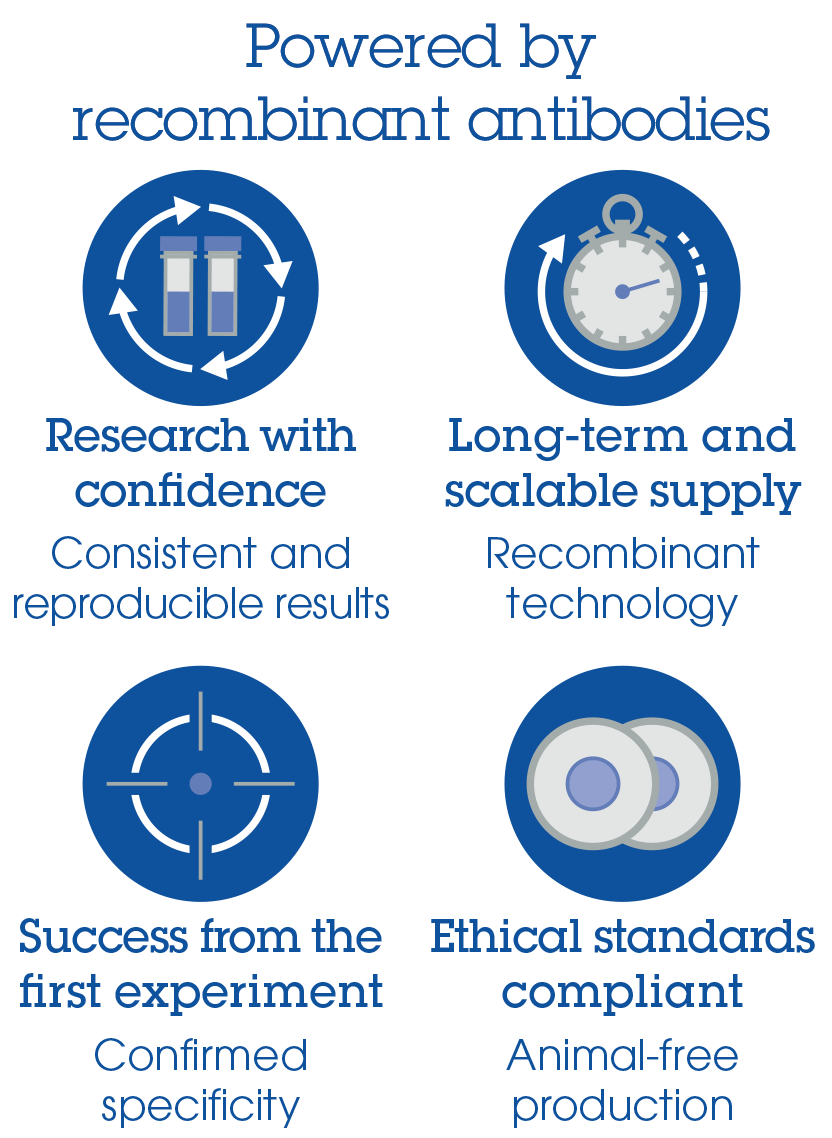Human CTLA-4 Antibody Pair - BSA and Azide free (ab267723)
Key features and details
- Unconjugated capture and detector antibodies
- Adaptable to any antibody pair-based assay format
- Antibody concentration ~ 1 mg/ml
- BSA and azide free buffer - ready for conjugation
Overview
-
Product name
Human CTLA-4 Antibody Pair - BSA and Azide free
See all CTLA4 kits -
Assay type
ELISA set -
Range
46.875 pg/ml - 3000 pg/ml -
Product overview
The Antibody Pair can be used to quantify Human CTLA-4. BSA and Azide free antibody pairs include unconjugated capture and detector antibodies suitable for sandwich ELISAs. The antibodies are provided at an approximate concentration of 1 mg/ml as measured by the protein A280 method. The recommended antibody orientation is based on internal optimization for ELISA-based assays. Antibody orientation is assay dependent and needs to be optimized for each assay type. Both capture and detector antibodies are rabbit monoclonal antibodies delivering consistent, specific, and sensitive results.
For additional information on the performance of the antibody pair, see the equivalent SimpleStep ELISA® Kit (ab264616), which uses the same antibodies. However, due to differences in their formulation, this antibody pair cannot be used with the consumables provided with our SimpleStep ELISA Kits. Please note that the range provided for the pairs is only an estimation based on the performance of the related product using the same antibody pair. Performance of the antibody pair will depend on the specific characteristics of your assay. We guarantee the product works in sandwich ELISA, but we do not guarantee the sensitivity or dynamic range of the antibody pair in your assay.
Download SDS here.
-
Tested applications
Suitable for: Sandwich ELISAmore details -
Platform
Reagents
Properties
-
Storage instructions
Store at +4°C. Please refer to protocols. -
Carrier free
Yes -
Components 10 x 96 tests Human CTLA-4 Capture Antibody (unconjugated) 1 x 100µg Human CTLA-4 Detector Antibody (unconjugated) 1 x 100µg -
Research areas
-
Function
Inhibitory receptor acting as a major negative regulator of T-cell responses. The affinity of CTLA4 for its natural B7 family ligands, CD80 and CD86, is considerably stronger than the affinity of their cognate stimulatory coreceptor CD28. -
Tissue specificity
Widely expressed with highest levels in lymphoid tissues. Detected in activated T-cells where expression levels are 30- to 50-fold less than CD28, the stimulatory coreceptor, on the cell surface following activation. -
Involvement in disease
Genetic variation in CTLA4 influences susceptibility to systemic lupus erythematosus (SLE) [MIM:152700]. SLE is a chronic, inflammatory and often febrile multisystemic disorder of connective tissue. It affects principally the skin, joints, kidneys and serosal membranes. SLE is thought to represent a failure of the regulatory mechanisms of the autoimmune system.
Note=Genetic variations in CTLA4 may influence susceptibility to Graves disease, an autoimmune disorder associated with overactivity of the thyroid gland and hyperthyroidism.
Genetic variation in CTLA4 is the cause of susceptibility to diabetes mellitus insulin-dependent type 12 (IDDM12) [MIM:601388]. A multifactorial disorder of glucose homeostasis that is characterized by susceptibility to ketoacidosis in the absence of insulin therapy. Clinical fetaures are polydipsia, polyphagia and polyuria which result from hyperglycemia-induced osmotic diuresis and secondary thirst. These derangements result in long-term complications that affect the eyes, kidneys, nerves, and blood vessels.
Genetic variation in CTLA4 is the cause of susceptibility to celiac disease type 3 (CELIAC3) [MIM:609755]. It is a multifactorial disorder of the small intestine that is influenced by both environmental and genetic factors. It is characterized by malabsorption resulting from inflammatory injury to the mucosa of the small intestine after the ingestion of wheat gluten or related rye and barley proteins. In its classic form, celiac disease is characterized in children by malabsorption and failure to thrive. -
Sequence similarities
Contains 1 Ig-like V-type (immunoglobulin-like) domain. -
Post-translational
modificationsN-glycosylation is important for dimerization.
Phosphorylation at Tyr-201 prevents binding to the AP-2 adapter complex, blocks endocytosis, and leads to retention of CTLA4 on the cell surface. -
Cellular localization
Cell membrane. Exists primarily an intracellular antigen whose surface expression is tightly regulated by restricted trafficking to the cell surface and rapid internalisation and. - Information by UniProt
-
Alternative names
- ALPS5
- CD
- CD 152
see all
Images
-
To learn more about the advantages of recombinant antibodies see here.








